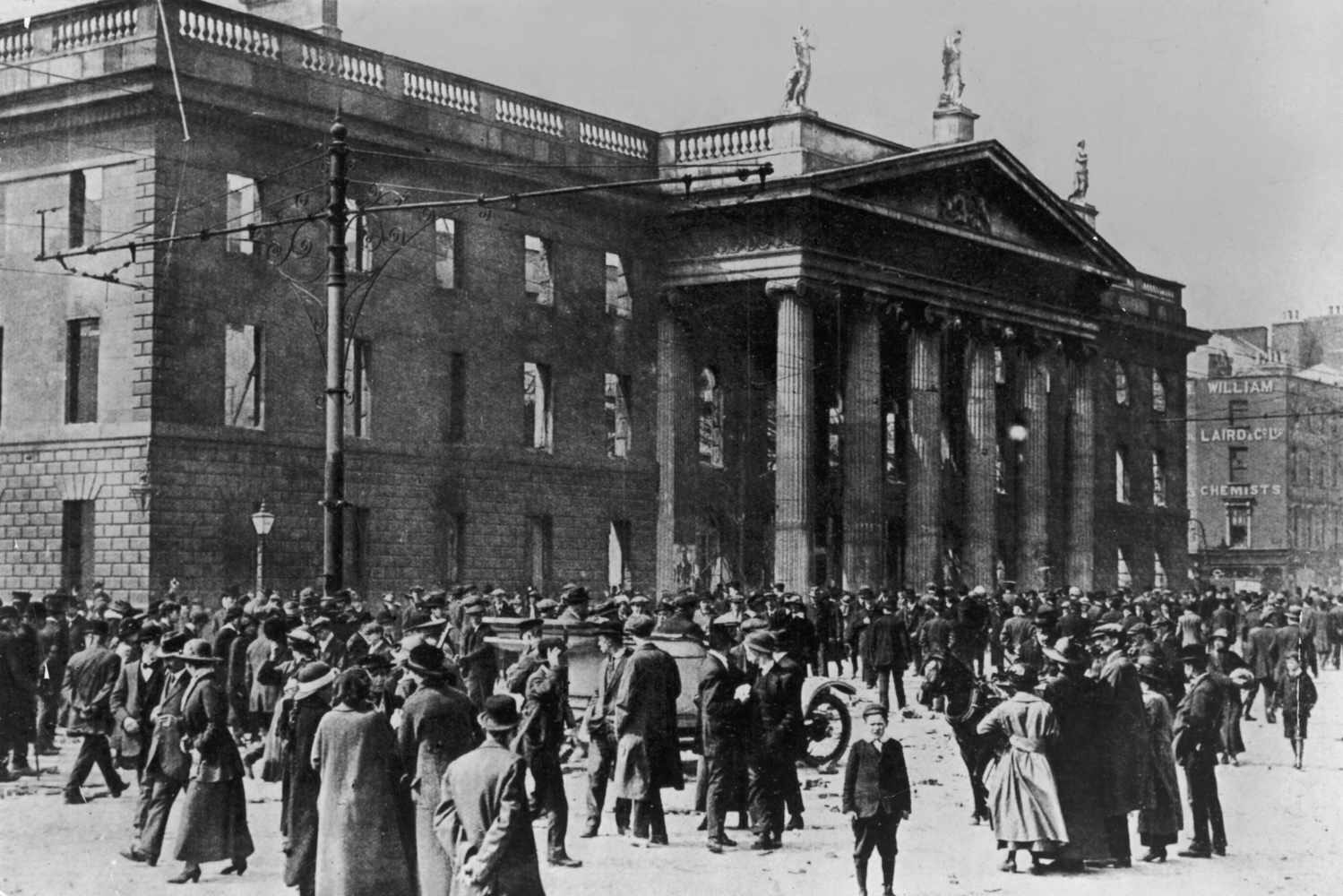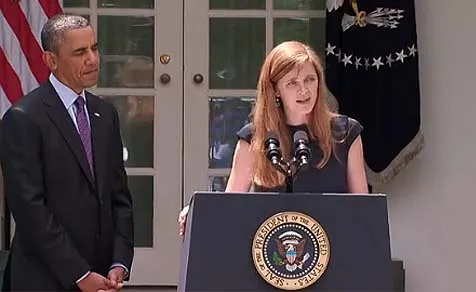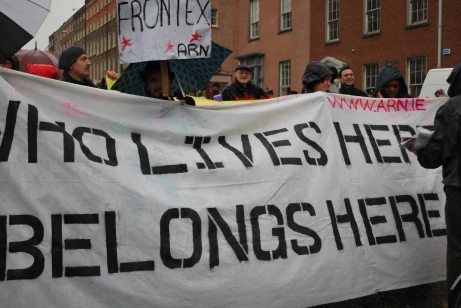Alán Camilo Cienfuegos discusses the true legacy of the bizarrely beloved JFK.
It is 50 years since John F. Kennedy, then president of the US, visited Ireland, in 1963. And now, just as then, the media both here and in the US is replete with praise and admiration for the man, America’s first Catholic president, the great-grandson of Irish emigrants from County Wexford. The Irish Times piece of June 19th entitled ‘Flame transfer celebrates transformational John F. Kennedy’ is particularly illuminating in its quoted praise for the former president, describing a memorial service in Washington’s Arlington Cemetery on June 18th, at which the ‘eternal flame’ at Kennedy’s graveside was transferred to a torch, to be carried to Dublin and thence to New Ross in Co. Wexford by Irish Navy vessel, where it will light an ‘emigrant flame’ on the quay front. The ceremony is to be attended by Enda Kenny, President Kennedy’s daughter Caroline, and his sister and former ambassador to Ireland Jean Kennedy Smith.
The ceremony in Arlington is described as ‘sombre’, ‘dignified’. Minister of State Paul Keogh, representing the government, said “When president Kennedy came to visit he brought a message of hope and inspiration. He encouraged Ireland to be proud and confident of itself and its place in the world. He was the living proof that Irish people could do anything they set their minds to do.”
Indeed. Irish people could do anything they set their minds to.
What is tellingly missing from the Irish Times piece and many others like it is a reflection on the true legacy of John F. Kennedy, stripped of the glamorous mystique and near-beatification the man has been subject to since his assassination in 1963. Forget the portraits of Kennedy hanging beside those of Pope John Paul II on the mantelpiece; forget the man remembered as a hero and role-model for benevolent American foreign policy. John F. Kennedy is chiefly described as a man of peace, who skilfully pulled the world back from the brink of nuclear war with the Soviet Union during the Cuban missile crisis, and set the stage for nuclear non-proliferation treaties with the United States’ communist foes.

Forget that for now. What’s missing from all the eulogies for John F. Kennedy in the media these days? Inconvenient things like Vietnam. The Bay of Pigs. Israel.
Yes, ultimately John F. Kennedy was just one more in a long line of US presidents promoting war and violence around the globe, intent on spreading America’s idea of ‘democracy’ to any country that suited its economic and strategic purposes in its global duel with the USSR. It was in the years immediately after World War II that the United States truly developed its current messiah complex, its vision of itself as the world’s policeman; and John F. Kennedy was a significant figure in entrenching that view in American foreign policy.
So just what is the real legacy of John F. Kennedy, beyond the whitewashed obituaries of the western press?
Vietnam. Kennedy was one of the chief architects of what would become the Vietnam war, a conflict unparalleled in the latter half of the 20th century for its barbarity and appalling loss of life. When Kennedy took over the presidency of the US from Dwight Eisenhower, the CIA’s plan for intervention in South-East Asia was already afoot. Did Kennedy roll it back? Hardly.
Kennedy formed a partnership with then South Vietnamese president Ngo Dinh Diem, which would see millions of dollars of military aid provided to the South Vietnamese government to help them combat the communist National Liberation Front, which had played a major part in bringing French colonial rule in the region to an end. Kennedy gradually increased the level of military support to the Diem government, providing more and more money, equipment, training, and from hundreds, to thousands of ‘military advisers’ in the form of CIA operatives and US Special Forces. In 1962 Kennedy ramped up US involvement even more, and authorised programmes like ‘Strategic Hamlet’, which provided for the forced relocation and segregation of hundreds of thousands of Vietnamese peasants to isolate them from the communists, to whom they were sympathetic. Another operation given the green light on Kennedy’s watch was ‘Operation Ranch Hand’ – the systematic defoliation of South Vietnam’s forests and jungles, using incredibly toxic and carcinogenic chemicals like ‘Agent Orange’. The effects of these chemicals are still being felt today, with inordinately high levels of dioxins, cancers and birth defects among people living in the most affected areas. The escalation of the US military’s involvement in Vietnam would continue right up until Kennedy’s death.

Whether the level of US involvement in Vietnam would have remained as it was had Kennedy lived is a matter of speculation, as is the debate over whether he would have ended the war entirely had he remained in office. These arguments are worthless. By the end of 1961, Kennedy’s first year in office, the number of US ‘military advisers’ in Vietnam was 3,205. By the time of his assassination in 1963 the number was 16,700 and rising. Regardless of idle speculation and ‘what ifs’, the fact remains that John F. Kennedy proactively laid the foundations for one of the most savage and costly wars in modern history, that claimed the lives of over 3 million Vietnamese people and over 57,000 US military personnel. In May of 1963 Kennedy assessed the situation in Vietnam, stating: “We don’t have a prayer of staying in Vietnam. Those people hate us. They are going to throw our asses out of there at any point. But I can’t give up that territory to the communists and get the American people to re-elect me”.
In other words, he put his electoral ambitions over the lives of both American soldiers and the people of Vietnam, who would pay the heaviest price for Kennedy’s warmongering. One wonders does this quote appear on any JFK memorials or plaques.
What else should we remember Mr. Kennedy for?
How about the Bay of Pigs Invasion – the CIA’s attempt to overthrow the government of Cuba using 1,500 US-trained Cuban mercenary exiles. Although the plan was hatched by the prior administration, Kennedy ordered it to go ahead on April 17th, 1961 – with the subsequent death of over 400 of the invaders and the capture of the rest, and the utter defeat of the operation by the Cuban military. Kennedy was later forced to trade over $50 million worth of medical and food aid with the Cuban government for the release of the captives. One finds little mention in the eulogies for Kennedy of his attempts to overthrow a sovereign government.
How about the close relationship that JFK forged between the US and Israel? In 1960, Kennedy stated: “Israel will endure and flourish. It is the child of hope and the home of the brave. It can neither be broken by adversity nor demoralized by success. It carries the shield of democracy and it honours the sword of freedom”. He is credited with founding the US-Israel military alliance and ‘special relationship’ that has endured to this day, kicking it off by ending the arms embargo on Israel put in place by his predecessors, and the supplying of advanced anti-aircraft missiles in 1963.
Since Kennedy’s initiation of the US-Israel alliance the United States has been one of the biggest suppliers of arms and finance to the ‘Jewish State’, providing essential diplomatic and economic support to a country founded on the massacre and ethnic cleansing of its indigenous population. The war crimes and atrocities carried out by the state of Israel against the Palestinian people since its violent founding and right up to the present day, unabated, are well known and documented, and need not be recounted here in detail. One must only remember that the man who helped make possible the utter arrogance and impunity with which Israel carries out its crimes, thanks to the power of US backing, was John F. Kennedy.
Kennedy was certainly not the saint he has been made out to be in the western media. The positive aspects of his administration, such as the nuclear test-ban talks with the Soviet Union and the advancement of Civil Rights in the US, pale in comparison with the death and destruction in South East Asia, Latin America and the Middle East that his policies either directly caused or laid the groundwork for.
Yes, Kennedy showed that ‘Irish’ people could indeed do anything they set their minds to, including bomb and maim with the best of them. Current US president Barack Obama’s administration is a ghost of Kennedy’s. The image put forward by Obama is once more that of the benevolent and well-meaning democrat, a liberal making tough choices around the world to safeguard America’s security, just like Kennedy had to. Obama has even nominated as his ambassador to the UN another Irish-American in the Kennedy mould, one Samantha Power, of whom I have written before. Just like Kennedy, Ms. Power is the personification of the ‘good imperialist’, who spreads human rights and democracy at the tip of a cruise missile to all the dark and backward places outside America’s borders that need freeing.
When our own politicians here at home genuflect before the likes of John F. Kennedy and Barack Obama, one should remember who it is they are bowing down to – warmongers who have caused misery and suffering to countless millions the world over, in their mission to spread US dominance throughout the globe. The pathetic doffing of the cap undertaken by the likes of Enda Kenny and generations of Irish politicians before him only serve to show how weak and servile Ireland is and has been in the face of the US imperialism, placing economic and political ties with the world’s biggest bully before a principled stand against a country whose foreign and domestic policies have been some of the biggest crimes of the 20th century.
We would do well, when lighting the eternal flame to John F. Kennedy in New Ross this Saturday, to remember the people of Vietnam, the people of Palestine, and all those victims of US foreign policy around the world, who had to suffer, and continue to suffer, the consequences of Kennedy’s decisions, and the decisions of those who went before him and have come after him in the US presidency. Indeed, perhaps it is those people we would be better off lighting the candles for.



